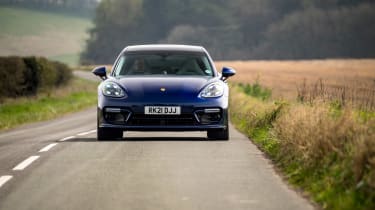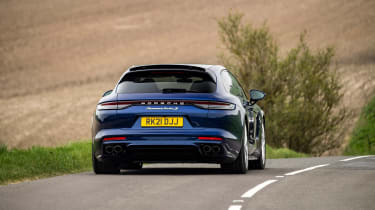Porsche Panamera (2016 - 2024) – performance and 0-60 time
The 4-litre V8 endows Turbo models with phenomenal performance; lesser versions are hardly slow too
Appropriately, there’s no such thing as a slow Panamera. Even the most basic one makes it to 62mph in 5.4sec with the optional Sport Chrono package fitted, which includes a launch control system. Torque from the base V6 is strong, too, so on the road it never feels lardy or strained, even if it lacks any real flare. The all-wheel-drive Panamera 4 cuts this time to 5.1sec.
All hybrid models come with Sport Chrono as standard, not to mention a slight boost on take-off thanks to the electric motor, meaning the E-Hybrid drops the 0-62mph time to 4.4sec, with the 4S E-Hybrid taking that down to 3.7sec.
Panamera S models have a more rawcus tune for the 2.9-litre V6 engine, reaching 62mph in 4.1sec (with Sport Chrono fitted), which is only 0.2sec behind the V8-powered GTS. The difference between the S and GTS is more prevalent in torque, where the two have a more substantial 52lb ft gap in the GTS’s favour, not to mention the extra two cylinders.
The pure-combustion Turbo S is the quickest of all Panameras with a 0-62mph time of 3.1sec, the extra mass of the Turbo S E-Hybrid negating its power advantage, taking 0.1sec longer.
Unlike many German saloon cars, the Panamera is not limited to 155mph. Instead the maximum top speed ranges from 167mph for the 4 to 196mph for both the Turbo S models. Despite an approximate 30kg weight increase, the Sport Turismo models are no slower to 62mph than conventional Panameras with the same drivetrain.
What does this all feel like on the road? After continual improvements to calibration over their lifespan, all E-Hybrid models now feel more integrated and rounded than ever before. The electric motor gently blends into the combustion powertrain in most normal driving, while giving a definite kick in Sport and Sports Plus driver modes.
The effect is less pronounced the higher up the range you go, and when in top-spec Turbo S E-Hybrid form, the contribution to the car’s mass in context to its additional performance actually renders it the least impressive – something especially apparent now the non-hybrid Turbo S offers even more performance.





